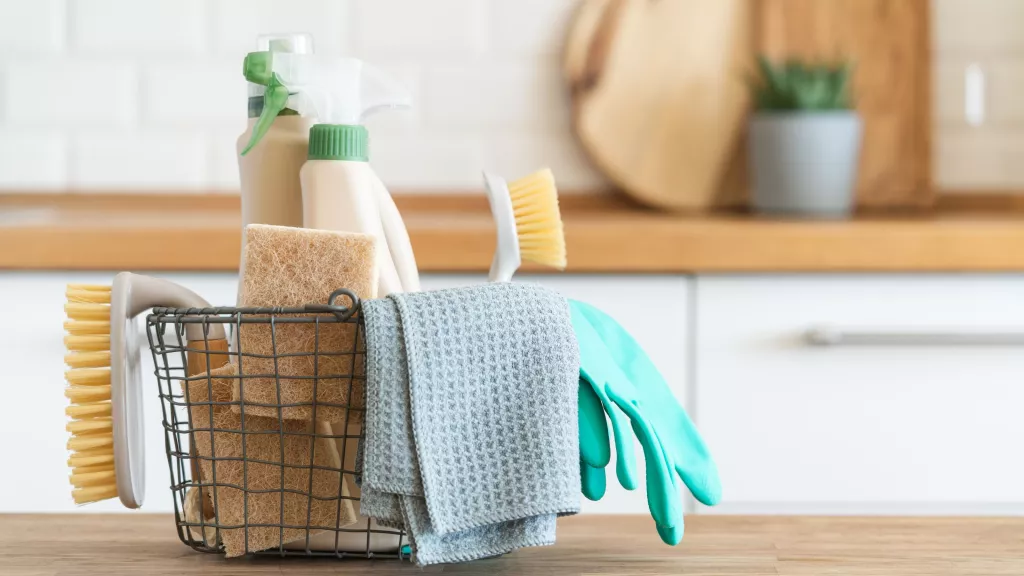At gardendesignideas.net, we understand the importance of maintaining a clean and healthy living environment while also being mindful of the impact our choices have on the planet. In this comprehensive guide, we bring you a collection of natural cleaning hacks that will not only help you achieve spotless cleanliness but also promote sustainability. Say goodbye to harsh chemicals and hello to eco-friendly alternatives that are equally effective. Let’s dive right in!
1. Harnessing the Power of Vinegar and Baking Soda
Sparkling Surfaces with Vinegar
Vinegar, a versatile household ingredient, serves as an excellent natural cleaner due to its acidic properties. For a simple and effective all-purpose cleaner, mix equal parts white vinegar and water in a spray bottle. This solution can be used to clean windows, countertops, and even remove stubborn stains from fabrics. The acetic acid in vinegar acts as a disinfectant, killing germs and leaving surfaces sparkling clean.
Banishing Odors with Baking Soda
Baking soda, another pantry staple, is not only useful for baking but also serves as a powerful deodorizer and stain remover. Sprinkle baking soda on carpets, upholstery, or even inside shoes to absorb unpleasant odors. When combined with vinegar, it creates a fizzing reaction that helps tackle tough stains, such as those on kitchen sinks or bathroom tiles.
2. Citrus Freshness and Natural Scents
Citrus Solvent for Grease
Citrus fruits like lemons and oranges possess natural cleaning properties. The high acidity of these fruits makes them ideal for cutting through grease and grime. Squeeze some lemon juice onto a sponge or mix it with vinegar for an effective solution to clean greasy stovetops, oven interiors, or microwave ovens. The fresh citrus scent will leave your kitchen smelling delightful!
DIY Air Fresheners
Instead of relying on synthetic air fresheners, which can contain harmful chemicals, create your own natural alternatives. Combine water with a few drops of your favorite essential oil, such as lavender, peppermint, or eucalyptus, in a spray bottle. Spritz the mixture around your home to enjoy the invigorating scents without compromising air quality.
3. Nature’s Secret Weapons
The Mighty Power of Salt
Salt is not only a seasoning for your meals but also a valuable ally in your cleaning arsenal. Sprinkle salt on fresh spills to absorb the liquid and prevent staining. Combine it with lemon juice to remove rust stains from metal surfaces or use it to scrub away tough grease in your kitchen.
The Wonder of Castile Soap
Castile soap, made from vegetable oils, is a biodegradable and non-toxic alternative to conventional soaps. It’s an excellent all-purpose cleaner that can be used on a wide range of surfaces, including floors, countertops, and even laundry. Mix it with water and essential oils to create your own custom-made cleaning solutions.
4. Embracing Sustainable Cleaning Tools
Microfiber Magic
Microfiber cleaning cloths are an environmentally friendly alternative to disposable paper towels. These highly absorbent cloths can be used with just water or in combination with natural cleaning solutions to effortlessly remove dirt, dust, and grime from various surfaces. They can be washed and reused multiple times, reducing waste and saving you money.
Natural Bristle Brushes
Upgrade your cleaning routine with natural bristle brushes, which are not only effective but also gentle on surfaces. From scrubbing bathroom tiles to dusting delicate surfaces, natural bristle brushes offer an eco-friendly option to tackle various cleaning tasks. Their durability ensures they will be long-lasting additions to your cleaning toolkit.
5. Eco-Friendly Disposal and Recycling Tips
Proper Disposal of Cleaning Waste
When practicing natural cleaning, it’s important to consider proper waste disposal. Avoid pouring cleaning solutions directly down the drain as they can harm aquatic life and pollute water sources. Instead, dispose of them in accordance with local regulations. Check if your community offers hazardous waste collection facilities or recycling programs for specific cleaning products.
Recycling Packaging and Containers
Reduce your environmental footprint by opting for cleaning products that come in recyclable or reusable packaging. Look for eco-friendly brands that prioritize sustainability and offer refillable options. By choosing products with minimal packaging waste, you contribute to reducing landfill waste and promote a circular economy.
6. Creating a Natural Cleaning Routine
Establishing a Cleaning Schedule
Maintaining a clean and organized home is easier when you establish a regular cleaning routine. Set aside dedicated time each week to tackle different areas and tasks. This ensures that cleaning becomes a manageable and consistent part of your lifestyle.
Natural Cleaning Checklist
To help you stay organized and efficient, here’s a simple natural cleaning checklist:
- Dust and wipe surfaces using microfiber cloths.
- Clean windows and mirrors with a vinegar-water solution.
- Scrub sinks, tubs, and toilets using baking soda and vinegar.
- Sweep or vacuum floors and carpets.
- Mop hard floors with a solution of water and castile soap.
- Refresh the air with DIY natural air fresheners.
- Clean kitchen appliances and countertops with citrus-based cleaners.
- Launder linens using eco-friendly laundry detergent.
With these natural cleaning hacks, you can maintain a spotlessly clean home while minimizing your impact on the environment. From harnessing the power of vinegar and baking soda to embracing citrus freshness and sustainable cleaning tools, you now have a comprehensive guide to outrank the competition in eco-friendly cleaning tips.
Remember, by incorporating these practices into your cleaning routine, you not only create a healthier living space for yourself and your loved ones but also contribute to a greener, more sustainable planet.




